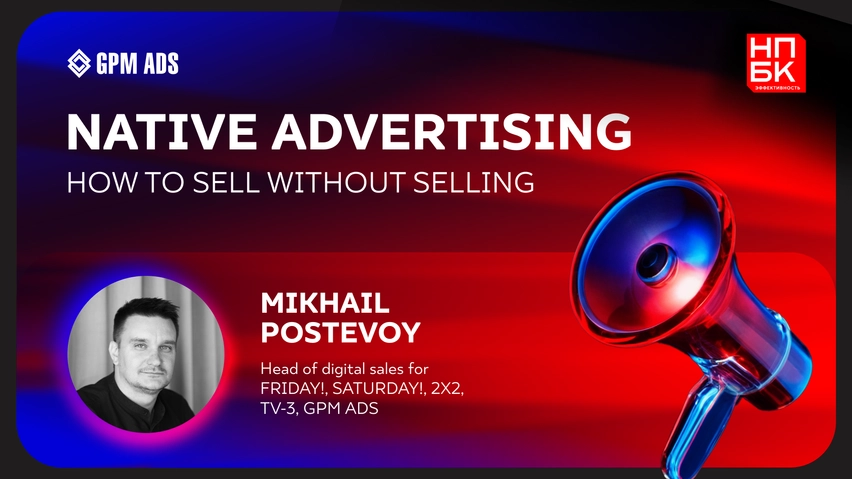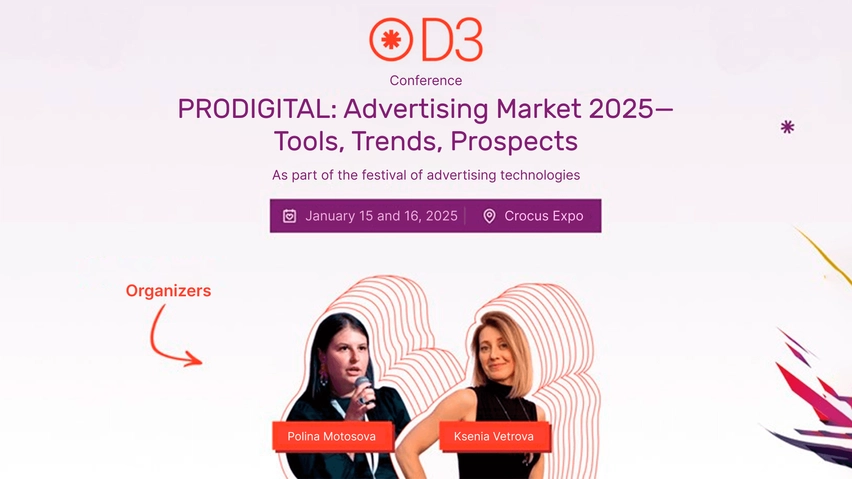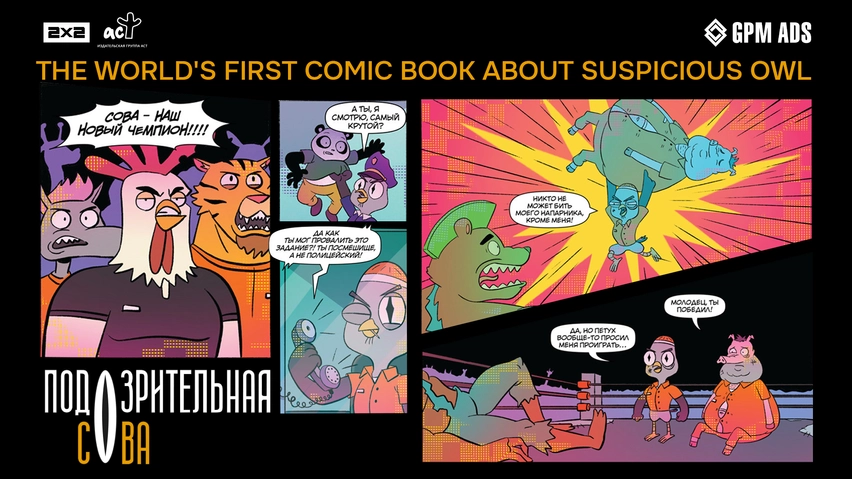 copy (1).png?quality=100&width=2270&format=webp)
August 01, 2024
Licensing
How manufacturers can profit from media brands
Today, there is fierce competition for customers in every single business segment. Companies are looking not only to reach new audiences, but also to strengthen relationships with loyal customers. Among the myriad promotion strategies, suppliers and manufacturers must choose the most effective and proven methods to retain their audience and drive sales. Licensing can be considered one such method. Through collaborations with popular TV content, retailers and manufacturers have a unique opportunity to enhance brand value and boost profits.
Eduard Ayrapetyan, Managing Director of Licensing at GPM Ads (the sales house of Gazprom-Media Holding) explained how manufacturers can profit from media brands.
Expert brands as trust markers
The results1 of an Ipsos consumer behavior study show that 77% of Russians still rely on product quality when making purchases. It is important for people to try a product for themselves before evaluating its advantages and deciding on its future use. However, when it comes to buying from a new brand, consumers prefer to support their choice by considering the opinions of influencers or experts. Products endorsed by well-known hosts of popular TV shows inspire more trust and approval among buyers, even if the brand is not yet well established. More and more brands pop up on the shelves of major retail chains that need to build awareness and external endorsement to find their way into the shopping cart faster. Expert TV programs from channels like Friday!, TNT, and NTV can serve as trust markers to enhance product quality.

Cooking shows
In the food segment, cooking shows and their celebrity hosts, who act as opinion leaders and evoke associations with specific product segments, can serve as a seal of quality. For instance, “Food of Life with Sergey Malozyomov (Zhivaya Yeda s Sergeyem Malozyomovym)” on NTV debunks myths about food from a scientific perspective and offers trivia about products and technology. The popular host talks about proper and healthy nutrition and offers his independent expert opinion. The show’s seal of quality boosts consumer trust and makes these products stand out as verified and superior options.

“Hell Chef (Adskiy Shef)”, “Master Pastry Chef (Master Konditer)”, “Chef Battle (Bitva Shefov)”, “The King of Desserts (Korol’ Desertov)” and other cooking competition shows on Friday! allow viewers to immerse themselves in the action while discovering unique recipes and cooking techniques. Hosted by celebrity chefs like Konstantin Ivlev, Renat Agzamov, and Olga Vashurina, these shows foster emotional connections and trust in licensed products based on popular media projects. Such programs have established themselves as recognizable brands with strong positioning, opening up opportunities to create a comprehensive advertising campaign around the product.

Home improvement shows
Non-food products also benefit from expert endorsement. Consumers often find it difficult to choose among the many types of household appliances, building materials, automotive products, and other product categories that are functionally similar. Licensing popular home improvement shows helps manufacturers differentiate themselves and build brand equity. For example, NTV’s “The Housing Question (Kvartirny Vopros)” and “The Dacha Solution (Dachny Otvet)” can serve as a clear and familiar indicator of trust for products related to building and improving a dream home. These products can range from building materials that are critical at the beginning of a renovation to decorative items that help create a cozy environment in the new home.
Family shows
Two other segments where expert endorsement is critical are children’s products and “family products”. Caring for loved ones encourages people to be extra careful in their choice of brands. Even the price is not always a key indicator of trust in this case. This makes the task of capturing and retaining consumer attention in these categories a challenge for manufacturers. Once again, media brands that have earned the love and trust of millions of families across the country come to the rescue. The primary target audience for these product groups is women with children. They represent the most license-oriented consumer segment and are often decision-makers when it comes to choosing household products. The same target group is the main audience for TV projects like “Moms of Friday (Mamy Pyatnitsy)”—a guide to motherhood, or “Smartest of All (Umnee Vsekh)”—an intellectual quiz show on Friday! where kids can earn real money with their knowledge. By licensing these programs as part of their promotional efforts, retailers can significantly increase their chances of success with buyers.
Self-identification and self-realization through media brands
Social initiation is an important need for teenagers and young adults in today’s society. During this period of growing up and finding themselves, individuals have a strong need for allies: people who share their values and ideals. The desire to belong shapes people’s interests and behavioral strategies, and helps a person build their own identity. Typically, celebrities, movie characters, or participants in popular shows serve as role models for entire groups or specific individuals.
The culture of TV series
Multiple generations have grown up watching TV series. Many of these series remain a part of viewers’ lives for decades. Typically, viewers do not just watch the plot unfold; they experience the story together with the characters and empathize with them. By immersing themselves in these multi-episode shows, viewers find themselves in their favorite characters, sometimes consciously or subconsciously adopting their personas.
By licensing such media projects for promotion, companies gain new loyal audiences based on viewers’ deep-seated affinity for these franchises. A successful example of this is the licensed promotion for the real estate company Etagi, based on TNT’s most popular sitcom, “SashaTanya”. Millions of viewers have watched the show over its ten-year run, discovering relatable behaviors in its main characters. This has created a special emotional connection with the audience that Etazhi was able to effectively leverage to achieve its own business goals. Within two months of the campaign, the agency achieved record results: a 19.6% increase in transactions2, a 23.2% increase in spontaneous brand awareness, and a total TV reach3 of 5.1 million.

Character-driven shows
The simplest way to demonstrate group affiliation is through the incorporation of certain items into one’s appearance. This could include clothing with the symbolism of role models, customized accessories (socks, bags, hats, etc.), or any other items that convey the desired mood and personality. A great example of such licensed integration is “New Tomboys (Novye Patsanki)” on Friday!. “New Tomboys” is a social reality show that focuses on the resilience, courage, and freedom of expression exhibited by its participants. Watching the heroines of the show, viewers experience all the challenges alongside them and celebrate their victories as if they were their own. Licensed products and services that evoke associations with beloved TV shows allow fans to feel special and turn each purchase into a unique experience.
Adult animation
TV shows and series are not the only forms of media that allow audiences to satisfy their need for self-identification. Animated shows and adult animation also cater to this demand. This content helps adults temporarily revisit a carefree childhood and indulge their inner child. Projects of the 2x2 channel fully address these motivations. Characters from popular animated series like “Suspicious Owl (Podozritelnaya Sova)”, “Inland Memepire (Vnutrennyaya Mimperiya)”, “The Bandit Peterburger (Banditskiy Peterburger)”, and “Do Magic Outta Here (Kolduy Otsyuda)” embody an ideology of eternal youth. Moreover, these shows captivate viewers with bold humor, sarcasm, intense relatability, and unique charm. Licensing integrations with this message enhance product appeal, giving consumers a sense of breaking free from conventional boundaries and stereotypes.

Entertainment content as a key purchase trigger
Joyconomy remains the leading consumer trend. Research from Ipsos confirms this, with comedy content ranking highest (54%) among key interests of licensed product consumers. People crave positive emotions and vivid experiences, often making purchasing decisions based on whether a product meets these emotional needs. Manufacturers can tap into this motivation through licensed collaborations based on popular entertainment content.
Comedy shows
Humor provides a much-needed break from troubling news in turbulent times, allowing people to enjoy a positive experience, something that is sorely lacking in today’s reality. By featuring recognizable comedic content in promotion, brands not only capture buyers’ attention but also provide these essential uplifting emotions. Such licensed integrations could draw from shows like “Once Upon A Time In Russia (Odnazhdy v Rossii)”, “Comedy Club, Stand Up”, or Girls Only Stand Up Comedy (Zhensky Stand Up) — all produced by NORM Production for Comedy Club Production. This bold, uninhibited, and relevant comedy consistently brings viewers back to their TV screens to catch new episodes. Products that can evoke direct associations with beloved comedy characters and viral jokes will be especially appealing and take more competitive positions.

Enhancing entertainment
Licensed products inspired by positive content extend the positive experience of interaction and enhance emotional engagement. This connection can be maintained through product-based gamification. A standout example of this is the joint promotional campaign of the potato chips brand Moskovskiy Kartofel and Match TV. A line of licensed, branded potato chip packages with the channel’s identity and the self-explanatory hashtag #everyonetothematch was designed specifically for sports fans. Participants in the promotion could activate the promo code from the bag on a dedicated website and submit their questions to popular sports commentator Georgy Cherdantsev, their favorite soccer player, or any of the channel’s experts. More than 27,000 users signed up during the seven weeks of the contest, asking over 20,000 questions4. The large-scale 360° advertising campaign increased sales of Moskovskiy Kartofel by 42%5. This successful collaboration allowed for precise targeting of the brand’s audience and monetization of the snack consumption pattern during game broadcasts and sports-themed TV shows.
GPM Ads, NTV, TNT, Friday!, “Match TV and 2x2 TV channels, and Comedy Club Production are all part of Gazprom-Media Holding.
1RusIndex, Russia 100+, all 16+, 2023–Q1 (Q1)
2Data based on internal research by Etagi
3Mediascope, TNT, Russia 100+, all 14–44, March–April 2024
4According to Yandex Metrica (Match TV, Sportbox), March–May 2024
5Data based on internal research by Moskovskiy Kartofel
Do you want to advertise?
Send us a message right now, and our managers will get back to you right away!
What type of advertising are you after?







.png?quality=100&width=852&format=webp)

 (1).jpg?quality=100&width=852&format=webp)

